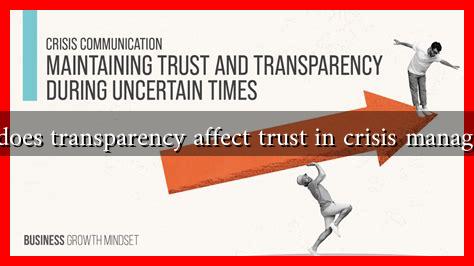-
Table of Contents
How Does Transparency Affect Trust in Crisis Management?
In an era where information is readily available and public scrutiny is at an all-time high, transparency has emerged as a critical component in crisis management. Organizations, governments, and leaders are increasingly recognizing that their ability to communicate openly and honestly during a crisis can significantly influence public trust. This article explores the relationship between transparency and trust in crisis management, supported by relevant examples, case studies, and statistics.
The Importance of Transparency in Crisis Management
Transparency refers to the practice of openly sharing information, decisions, and processes with stakeholders. In the context of crisis management, it involves timely and accurate communication about the nature of the crisis, the steps being taken to address it, and the potential impacts on affected parties. The importance of transparency can be summarized as follows:
- Builds Credibility: When organizations are transparent, they demonstrate accountability, which fosters credibility among stakeholders.
- Reduces Uncertainty: Clear communication helps to alleviate fears and uncertainties that often accompany crises.
- Encourages Collaboration: Transparency can facilitate cooperation among various stakeholders, including government agencies, NGOs, and the public.
- Enhances Reputation: Organizations that manage crises transparently are often viewed more favorably, which can enhance their long-term reputation.
Case Studies: Transparency in Action
Several case studies illustrate the impact of transparency on trust during crises:
The COVID-19 Pandemic
The COVID-19 pandemic serves as a prime example of how transparency can affect public trust. Countries that communicated openly about the virus’s spread, health guidelines, and vaccination efforts generally experienced higher levels of public compliance and trust. For instance:
- New Zealand: Prime Minister Jacinda Ardern’s government was praised for its transparent communication strategy, which included regular updates and clear messaging. This approach contributed to New Zealand’s successful containment of the virus.
- Sweden: In contrast, Sweden’s less transparent approach regarding its COVID-19 strategy led to public confusion and criticism, ultimately affecting trust in the government.
The BP Oil Spill
The Deepwater Horizon oil spill in 2010 is another significant case where transparency—or the lack thereof—played a crucial role in shaping public trust. BP’s initial response was criticized for being opaque and evasive, which led to:
- A decline in public trust in BP and its leadership.
- Increased scrutiny from regulatory bodies and the media.
- Long-term damage to BP’s reputation, which took years to rebuild.
In contrast, organizations that proactively communicated their actions and addressed public concerns during the crisis were able to maintain a level of trust that benefited them in the long run.
Statistics on Transparency and Trust
Research supports the notion that transparency is vital for building trust during crises. According to a study by the Edelman Trust Barometer, 81% of respondents stated that they need to be able to trust the brand to do what is right during a crisis. Furthermore, organizations that are perceived as transparent are 50% more likely to be trusted by their stakeholders.
Strategies for Enhancing Transparency
To effectively enhance transparency during a crisis, organizations can adopt several strategies:
- Regular Updates: Provide consistent updates to stakeholders about the situation and response efforts.
- Open Channels of Communication: Create platforms for stakeholders to ask questions and express concerns.
- Admit Mistakes: Acknowledge errors and outline corrective actions to demonstrate accountability.
- Engage with the Community: Involve community members in discussions to foster a sense of collaboration and trust.
Conclusion
In conclusion, transparency plays a pivotal role in shaping trust during crisis management. Organizations that prioritize open communication and accountability are more likely to maintain public trust, mitigate the impact of crises, and enhance their long-term reputation. As demonstrated through various case studies and supported by research, the benefits of transparency far outweigh the risks. In a world where information is power, embracing transparency is not just a best practice; it is a necessity for effective crisis management.

